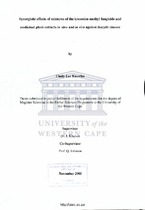| dc.description.abstract | The fungus Botrytis cinerea is an opportunistic pathogen on a wide variety of
crops, causing a disease known as grey mould through infections via wounds or dead
plant parts. Synthetic fungicides for controlling this disease are fast becoming
ineffective due to the development of resistance. This, coupled with consumers' world
wide becoming increasingly conscious of potential environmental and health problems
associated with the build-up of toxic chemicals, (particularly in food products), have
resulted in pressure to reduce the use of chemical pesticide volumes as well as its
residues.
An emerging alternative to random chemical synthesis is the study and exploitation
of naturally occurring products with fungicidal properties. One group of compounds
known as strobilurins produced by Strobilurus species, woodland basidiomycete fungi,
is a good example of this phenomenon. Plants produce an enormous array of
secondary metabolites, and it is commonly reasoned that a significant part of this
chemical diversity serves to protect plants against plant pathogens. A problem with
plant-produced compounds as potential fungicides is that in the natural state, they are
generally only weakly active compared to synthetic fungicides.
There have been reports on the uses of mixtures of synthetic fungicides for the
control of plant pathogenic fungi. When utilized in two-way mixtures, such
fungicides may maintain or enhance the level of control of a pathogen at reduced
rates for both components utilized in combinations, or alone at normal rates. These
studies provide an important precedent for the idea of synergism. For this study, we
hypothesize that the addition of plant extracts may enhance the antifungal efficacy of
the synthetic strobilurin fungicide, kresoxim-rnethyl against B. cinerea. We selected
South African medicinal plant species such as Artemesia afra, Elyptropappus
rhinocerotis, Galenia africana, Hypoxis hemerocallidea, Siphonochilus aetheopicus,
Sutherlundia frutescence, Tulbaghia violacea and Tulbaghia alliaceae for this study.
For the in vitro study, indigenous medicinal plant extracts were prepared at twofold
dilution concentrations and combined with kresoxim-rnethyl at concentrations of
0.25 and 0.5% (w/v). The B. cinerea mycelial plug assays showed potent antifungal
inhibitory effects with the plant extract and kresoxim-rnethyl mixtures. Further
analyses of the mixtures indicate synergistic effects between the fungicide and plant
extracts. I surmise that these in vitro effects are also achievable in vivo.
Combinations of these agents represent an attractive avenue for the development of
new management strategies for controlling B. cinerea in the future.
A second study was conducted to analyse the final dose rates for synergistic
reactions for combinations of kresoxim-methyl and medicinal plant extracts against
B. cinerea in vivo. A series of two-fold concentrations of medicinal plant extracts
were combined with kresoxim-methyl to conduct decay inhibition studies on Granny
Smith apples. Synergistic effects were observed for many of the kresoxim-methyl
and plant extract combinations. I, therefore, came to the conclusion that indigenous
South African plant species produce modulators that potentiate the activity of
fungicides. Whether these synergistic effects are due to the inhibition of fungal
multi-drug resistant pumps require further studies at the molecular level. However,
these inhibitory effects are likely to be advantageous for developing fungicide
formulations and application strategies with low toxicity effects on the environment.
This approach not only makes it possible to reduce fungicide concentrations while
maintaining adequate decay control, but also ensures a reduction of the chemical
residue on the fruit. | en_US |

